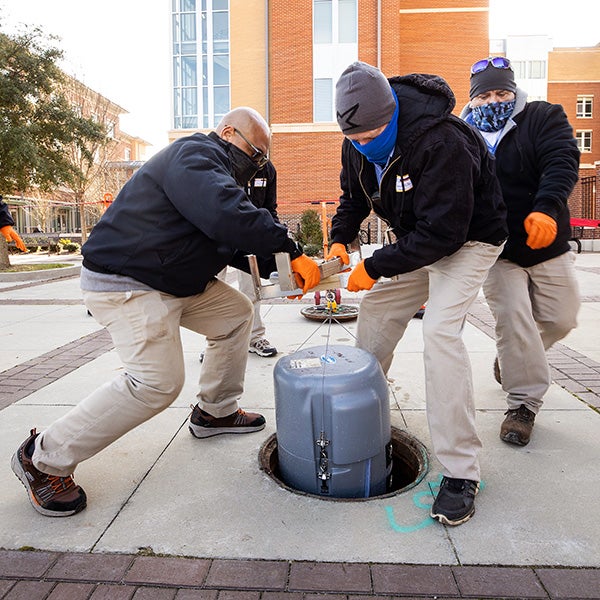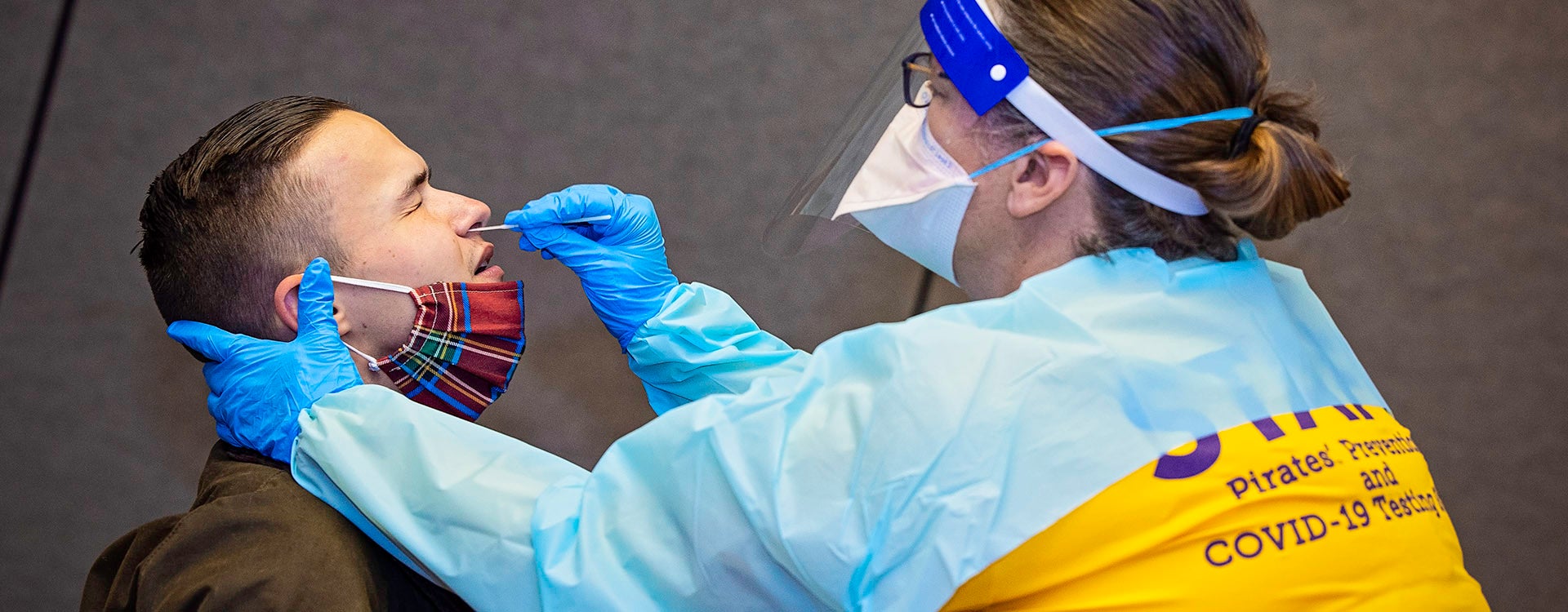TESTING TIME
Saliva testing will begin in February for ECU students, faculty and staff
With the spring semester underway, East Carolina University will offer another COVID-19 test option for students, faculty and staff.
Saliva testing will begin later in February as part of a mass surveillance effort for people who do not have symptoms, have not been exposed to COVID-19 and have not tested positive in the past.
ON CAMPUS
ECU’s Department of Pathology and Laboratory Medicine in the Brody School of Medicine and ECU Student Health Services have partnered for COVID-19 testing since the pandemic started in 2020. As of Jan. 14, 14,167 tests have been completed with about 1,200 positives. About 38% of positive cases were asymptomatic. The peak on campus was Aug. 23-29 with a positivity rate of 8.5%.
Testing Thursdays will begin Feb. 4 at Student Health Services on main campus and the health sciences campus. PCR and antibody tests along with flu shots will be given by appointment and filed to insurance. Call 252-328-6841 to schedule an appointment. Saliva testing will be added to Testing Thursdays later in February.
For more information, visit ECU’s Spring Testing Plan website or COVID-19 and Campus Living.
“Saliva testing is easier and a more comfortable collection method,” said Dr. LaNika Wright, director of Student Health Services (SHS).
Because saliva testing involves spitting in a tube, rather than a nasopharyngeal or nose swab, more people may agree to be tested and checked more often, helping to reduce cases or potential clusters.
Results are expected in 24 hours, and the test will be offered for free. Any positive saliva tests should be confirmed with a clinical test.
As part of Return to Pirate Nation’s on-campus testing plan for spring, students had to show a negative PCR test before moving into residence halls.
Between Feb. 1-3, SHS will be testing all on-campus students — about 1,900 — again. Students received an email from Campus Living with their assigned time for the free test, which will be done in the Main Campus Student Center. Testing is required for every on-campus resident unless they are part of another campus testing program (such as athletes) or have tested positive in the past 90 days.
Regular testing will continue for on-campus students throughout the spring semester.
All students should be tested, especially those who will be on campus for classes or other activities.
In addition to the planned saliva testing, another ECU surveillance effort geared at reducing transmission and outbreaks is already underway. Wastewater testing from residence halls began after students moved in for the start of spring semester classes on Jan. 19.
Virus is shed in feces and can be detected before anyone has symptoms or is asymptomatic. Several departments across campus are collaborating to collect, process and analyze wastewater samples three times a week. Follow-up diagnostic testing will be conducted with students if any samples come back positive.

ECU facilities services staff members remove a COVID-19 wastewater testing unit outside Tyler Residence Hall on College Hill. (Photo by Rhett Butler)
To determine whether someone is infected with SARS-CoV-2, the virus that causes COVID-19, there are two commonly available clinical tests:
- PCR (or RT-PCR) tests are used to detect genetic material of the virus. These are used to detect current active infection and are highly accurate when collected properly. Results are available in about 24 hours. “This is a very accurate test with some false negatives but very few false positives. If it says you have COVID-19, you’ve got it,” said Dr. Peter Schmidt, vice dean of the Brody School of Medicine.
- Antigen tests are also called rapid tests because results can be returned in 15-45 minutes. Like PCR tests, antigen tests are used to detect current active infection. Antigen tests search for a specific protein on the surface of the virus. Antigen tests have a higher chance for false negatives and can produce false positives. If used as a screening test — in asymptomatic patients — antigen tests have lower specificity than RT-PCR, Schmidt said. Results can be confirmed with a PCR test.
Wright said cost should not prohibit anyone from being tested. “Our goal is for no one to pay for a test,” she said. Anyone who has a concern regarding cost or whether their insurance will cover the test can contact SHS.
In addition to those tests, an antibody test can be used to determine previous infection. Antibody testing is done by examining blood serum and is typically available in about 48 hours.
Finally, the timing of tests is important. It can take up to seven days to build up enough virus in your body for a test to detect it. False negatives can put friends or family members at risk for exposure.
If you have been exposed to someone with COVID-19, or if someone tests positive within about two days of your being with them, you should quarantine for at least five days after your last exposure and then go to the clinic for testing, Schmidt said. Try to make an appointment for the fifth or sixth day. ECU Physicians, Student Health Services or Vidant should be able to get a test result within about 24 hours.

ECU student Collin Krenz gets tested for COVID-19 by Dr. Kristina Simeonsson in Mendenhall Student Center on Jan. 27. (Photo by Cliff Hollis)
